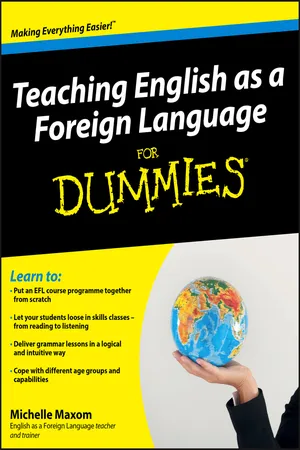Part I
Getting Started in TEFL
In this part . . .
This part covers the TEFL basics. Here's where I tell you all you need to know about why TEFL is a great idea and what the job can do for you, whether you want to teach whilst travelling round the world, or as a full-time career.
This part tells you what to expect in the TEFL environment and what the students expect from you, too. You should also dip in here to find out about the qualifications and training you need to meet your requirements and those of prospective employers. I also include the points you need to bear in mind if you're planning to move abroad to teach.
Chapter 1
Discovering the Wonderful World of TEFL
In This Chapter
Realising the need for English teachers
Finding out where you can teach
Travelling to foreign lands
Considering how far TEFL can take you
So you want to teach English as a foreign language. In this chapter you get an overview of the industry and an idea of what the lifestyle of a person in this rewarding career is really like.
Understanding Why English
Many factors contribute to the market for Teaching English as a Foreign Language The historical factor offers the legacy of the old British Empire that took the language around the world. The political factor gives the current dominance of the USA. Science and technology have developed with English at the forefront. In addition, there's a need for a global language to make international communications smoother, and tools such as the worldwide web truly accessible around the planet.
These days English is viewed as a language which gives you access to the world. Some want to study at prestigious English-speaking universities; some want a high flying career with international connections. Others just want a better chance in life and move to wherever the money seems to be, and then again, some just love Hollywood, international rock stars or their English girlfriend. Even the free-spirited backpackers need English to get by in far-flung lands.
Looking at the TEFL Marketplace
For most would-be TEFL teachers, the draw of the job is the ability to travel and work. Even if your responsibilities don't allow you to leave your own shores, at least working in TEFL brings other travellers to you.
Considering countries – both home and abroad
Before entering TEFL, give some consideration to where you want to teach and who your ideal students would be. Subtle differences exist between the criteria for teachers in English speaking countries and elsewhere. The training you need for particular student groups also varies. In addition, unlike a career change at home, teaching abroad presents challenges you may not have considered.
Staying in the home market
Finding work in TEFL in an English-speaking country can be more difficult than doing so abroad. The problem is that, unlike being a foreigner overseas, you have no novelty value when you're at home. As many English-speaking nations are economic powerhouses, they tend to have various regulatory bodies governing the employment of teachers and trying to ensure high standards in education. In other words you need to jump through more hoops to get a decent job.
Very often TEFL jobs are advertised as ESOL (English for Speakers of Other Languages) or ESL (English as a Second Language).Teaching English as a Foreign Language, English as a Second Language and English for Speakers of Other Languages are all the same kind of work depending on which country you're in and who your students are. There's a slight difference between learning a language to survive in the English-speaking country you now live in and learning English while you're in a non-English speaking country. ESOL students may be refugees or economic migrants who need help with day-to-day situations such as seeing the doctor or understanding letters from their child's school.
Many students are entitled to attend government funded courses or free classes run by charitable organisations. In addition, private language schools offer courses from two weeks up to two years. In the latter case, students pay for their lessons and often have other activities to make the experience more fun, including a social programme that teachers generally get involved with too.
Although the basic skills of the job are the same in each sector, you may not be eligible to apply for all of these jobs. The first thing you need is to be able to speak English well (whether you're a native speaker or not). Most employers require teachers to have a first degree and a TEFL qualification (certificate, diploma or Master of Arts) although in the public sector you usually need a qualification specifically for teaching adults in further education. Non-graduates can often get onto a training course but fewer job opportunities are available to them.
Amongst countries in the European Union things have been changing. Citizens of the EU have rights in the UK, including the right to enrol on courses offered by the state. This means that instead of learning English in their home country and then moving to the UK to look for work or higher education opportunities, it's quite feasible to move over and then learn the language through the state system and full immersion. There have been quite a few changes in the number of jobs offered in countries like Poland for these reasons. Unfortunately the British economy is not what it was, and as the world struggles with the recent banking crises, people are thinking twice about their prospects abroad anyway.
Working abroad
You can find far more opportunities for TEFL abroad than on home soil. The world is a big place, after all! However, despite the thrill of setting off on a new adventure overseas, you need to approach a TEFL work with a balanced outlook that considers both the advantages and the disadvantages.
The advantages are that:
You get to experience another culture and broaden your horizons.
You're involved in a rewarding occupation through which you can help others to change their lives.
You get paid as you slowly travel around the world.
If you already live abroad, you can find a job before you have mastered the local language.
You work with a skill you already have, speaking English.
But the disadvantages are that:
It's difficult to know what kind of employer you're getting involved with until you arrive in the country.
Once you've given up your home and job it isn't quite as easy to turn back.
You may feel thrown in at the deep end. Even if you get extensive training first, when you actually have your own class, most of the time it's just them and you.
You're unlikely to get rich. The best most EFL teachers abroad can hope for is a decent standard of living by local standards (which may be different from what you're used to) and enough money saved to get back home again.
You're out of the loop as far a...



